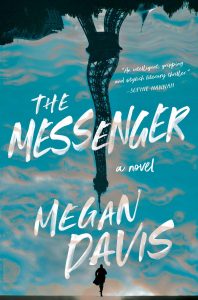Megan Davis on Parricide and the Story Behind The Messenger
Megan Davis on Parricide and the Story Behind The Messenger By Megan Davis
 I started writing my debut novel The Messenger, after my sons’ babysitter told me about a 16 year-old boy in her class at school who had just been convicted of killing his father. I was living in France at the time and my young children had just started at the same school as the babysitter and this boy.
I started writing my debut novel The Messenger, after my sons’ babysitter told me about a 16 year-old boy in her class at school who had just been convicted of killing his father. I was living in France at the time and my young children had just started at the same school as the babysitter and this boy.
The story stayed with me because it was the first time such a tragic story had entered my orbit.
In retrospect, I think I was feeling guilty about uprooting my kids from their friends and putting them into a school in a foreign country where they had neither friends nor the ability to make any, since they didn’t speak the language. They both hated their school and resented me each day for taking them there. In that context, I took a keener than usual interest in the patricide case, and I started wondering what it took for a child to really hate a parent so much they’d want to kill them. In the back of my mind, I was probably worried my kids would grow up wanting to murder me for this French experiment I had imposed on them.
The killing of a parent is the ultimate act of treachery, one that never ceases to shock. The idea that a child nurtured and raised within a family could one day rise up and kill the very people who have brought them into the world is horrifying. The term ‘parricide’ refers to the murder of a close relative, with patricide the term for the killing of one’s father, and matricide for the killing of one’s mother.
When I started writing my novel and researching parricide, I found it to be much more common than I had thought, and this is particularly the case in countries where there is easy access to firearms. In the U.S. alone there are on average 242 parricides a year. That’s about five instances a week of a child killing a father or mother[1].
This seemed like a lot to me, and after becoming aware of these numbers, I started noticing parricide headlines in the news and hearing about them elsewhere. A couple of acquaintances had stories about a friend of a friend who had killed their father, and the more I looked into it, the more instances I found.
In the majority of cases, the perpetrators were white middle-class males without a history of violence. Often a parricide happens because the youth fears for their life, is desperate to end a cycle of abuse, or is severely mentally ill, but there are also cases where a child kills in cold blood and the killing seems, at least on the surface, unmotivated.
It was this latter type of cases that interested me and I started thinking about the child-parent relationship in general – how volatile it can be, and how often a child goes through adolescence at the same time one or both of their parents are experiencing a midlife crisis. Often it is the child’s unreasonable behavior that is highlighted while the parents’ conduct goes unremarked. It was this collision of tensions I wanted to explore in my novel.
Parricide is a social taboo common across all cultures. Stories of parricide go back millennia to Orestes, Oedipus, King Arthur and Hamlet. The act contravenes two biblical commandments: ‘Honor thy father and mother’, and ‘thou shalt not kill’. I wanted to write my novel from within this taboo and explore the trajectory of a son, Alex, who hated a father he didn’t really know. The story follows Alex as he tries to make sense of the past and shows how Alex only comes to understand his father after he is dead.
In Oedipus, the main character unknowingly fulfills a prophecy of killing his father and marrying his mother. The story of Oedipus was a major theme in the work of Sigmund Freud, the father of psychoanalysis, and he used the name ‘the Oedipus complex’ to explain his theories about certain unconscious urges in early childhood centered partly around rivalry with the parent of the same sex.
Freud’s theories suggest that a parricidal urge is an essential part of human development. Many of us can relate to this as we all go through a phase growing up where we desperately want to be free of our parents and I think this is part of our enduring fascination with cases of parricide. In my novel, I explore the sense of revulsion a teenager can have for a parent. It’s often a real physical disgust and manifests itself as an urge to be rid of their influence in all spheres. Like a moth emerging from a chrysalis, adolescents have an urge to break familial ties and forge new ones that acknowledge their independence. Often the resentment goes both ways, with parents despairing of what their child has grown into, and this only adds to the tension.
Some studies have drawn attention to a correlation between parricide and economic turmoil, noticing a spike in the number of parricide cases after an economic crisis, for example. This suggests that cases of parricide fluctuate according to external pressures, which contribute to an increase in mental illness and maltreatment within families. If this is correct, then it is likely the number of parricides will only increase as inequality grows and we might begin to ask the question not why some children commit parricide, but why they do not.
In a case that gripped the world, the brothers Joseph [Lyle] and Erik Menéndez were convicted in 1996 of the murders of their parents and sentenced to life imprisonment without parole. During the trial, the brothers stated that they committed the murders out of fear their father would kill them after they threatened to expose him for years of sexual, emotional and physical abuse, while the prosecution argued they did it to inherit their father’s multimillion-dollar estate.
Public records of the true story upon which I based my novel were unavailable as the accused was a minor, but I felt a huge amount of sympathy for the boy. His father was an alcoholic, his mother had abandoned him and the family had moved around a lot when the boy was small.
I had grown up in many countries myself, and so I know how disorienting moving can be. Part of what I wanted to get across in The Messenger was the experience of not belonging, of always feeling like an outsider.
Parricide’s enduring fascination as a taboo and a crime is complex. It is at once a crime that flies in the face of human nature and also, in cases of familial abuse, a crime that makes horrible sense. Situated as it is within the family, parricide is the ultimate manifestation of the deadly and unknown threat that comes from within.
My children have so far managed to get through adolescence without killing me, but my interest in the topic after writing my novel has only grown. My research into parricide has made me see the connection between the fragility of adolescence and the family and how both are vulnerable to external attacks and pressures.
[1] This statistic comes from a 2007 analysis of US parricide cases over the period 1976-1999 Heide, Kathleen M. and Petee, Thomas A., Parricide An Empirical Analysis of 24 Years of U.S. Data. Journal of Interpersonal Violence, December 2007 2007; 22; 1382. http://jiv.sagepub.com/cgi/content/abstract/22/11/1382
—
 Megan Davis was born in Australia and grew up in mining towns across the world. Her debut The Messenger won the Bridport Prize for a First Novel, as well as the Lucy Cavendish Prize for unpublished writers. Megan Davis has worked in the film industry and her credits include Atonement, In Bruges, Pride and Prejudice, and the Bourne films. She has lived in many places including France for a number of years, but now lives in London where she is an associate at Spotlight on Corruption, an anti-corruption NGO. Read more at https://megandavis.co.uk/.
Megan Davis was born in Australia and grew up in mining towns across the world. Her debut The Messenger won the Bridport Prize for a First Novel, as well as the Lucy Cavendish Prize for unpublished writers. Megan Davis has worked in the film industry and her credits include Atonement, In Bruges, Pride and Prejudice, and the Bourne films. She has lived in many places including France for a number of years, but now lives in London where she is an associate at Spotlight on Corruption, an anti-corruption NGO. Read more at https://megandavis.co.uk/.
THE MESSENGER
Rosamund Lupton meets Lupinin this accomplished debut from an eclectic, cut-throat new voice in thriller writing.
‘A sleek, sinister debut’ WOMAN’S OWN
‘A strong, twisting, literary journey of revelation and redemption. Five stars’ JANICE HALLETT
‘An intelligent, gripping and stylish literary thriller – I couldn’t put it down. Megan Davis is a major new talent’ SOPHIE HANNAH
‘A sharply written, clever and classy thrill-ride through the streets of Paris’ CHRIS WHITAKER
Wealthy and privileged, Alex has an easy path to success in the Parisian elite his father mingles with. But the two have never seen eye to eye. Desperate to escape the increasingly suffocating atmosphere of their apartment, Alex seeks freedom on the streets of Paris where his new-found friend Sami teaches him how to survive. But everything has a price – and one night of rebellion changes their lives forever.
A simple plan to steal money takes a sinister turn when Alex’s father is found dead. Despite protesting their innocence, both boys are imprisoned for murder. Seven years later Alex is released from prison with a single purpose: to discover who really killed his father. Yet as he searches for answers and atones for the sins of his past, Alex uncovers a disturbing truth with far-reaching consequences.
Playing out against a backdrop of corruption, fake news and civil unrest, The Messenger exposes the gritty reality of a changing city through one son’s journey to redemption and the truth.
‘Megan Davis’s electric, suspenseful and stunning evocation of contemporary Paris is unforgettable’ ELIZABETH MACNEAL
‘A well-written, intriguing novel with an excellent sense of place’ KAMILA SHAMSIE
‘Compelling … A deft blend of murder mystery, political intrigue and family secrets’ DOMINIC NOLAN
BUY HERE
Category: Contemporary Women Writers, On Writing
























